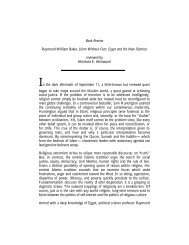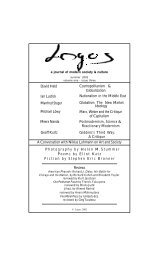Michael J. Thompson Stephen Eric Bronner Wadood Hamad - Logos
Michael J. Thompson Stephen Eric Bronner Wadood Hamad - Logos
Michael J. Thompson Stephen Eric Bronner Wadood Hamad - Logos
Create successful ePaper yourself
Turn your PDF publications into a flip-book with our unique Google optimized e-Paper software.
Robert J. Antonio<br />
control, violence, and repression and giving rise to the total state. Addressing<br />
Weber might have prompted Howard to clarify his concepts of politics of will<br />
and politics of judgment, which are central to his argument, but are left<br />
unelaborated. John Dewey’s radical democratic theory also seems to converge<br />
at key points with Howard’s project. Dewey stressed democracy’s uncertain,<br />
plural, discursive, historically particular, incomplete, experimental nature. He<br />
aimed to fashion a radically historicist, antifoundationalist democratic<br />
alternative to Hegelian historicism that breaks as fundamentally from modern<br />
ideas of historical necessity as it does from traditional metaphysics, religion,<br />
and political philosophy. Also, Dewey posed his mature social theory contra<br />
totalitarianism—Fascism and Stalinism. Engaging Dewey critically also might<br />
have sharpened Howard’s argument. However, his failure to address these<br />
particular thinkers is not problematic per se. Rather, the problem is that he<br />
does not situate adequately his theory relative to related political theories and<br />
social theories. Developing this theoretical context would have helped Howard<br />
bring forward more clearly and completely his overall position on democracy<br />
and its connections to current historical and political contexts.<br />
Howard’s unqualified claims about the “autonomy” and “radical<br />
indeterminacy” of politics and negative comments about “the flat terrain of<br />
sociology” and the “mere sociologist” (pp. 77, 81) draw an overly sharp<br />
boundary between politics and its “sociological” contexts. Exaggerating the<br />
threat of sociological reduction, he largely ignores the interdependence between<br />
these relatively autonomous spheres. Moreover, he does not distinguish the<br />
pseudo-sociology employed in bogus historicist arguments from genuine<br />
sociological inquiry about conditions that influence the direction and content<br />
of politics. He recognizes passingly that sociological analysis may have a<br />
limited role in normative critique, but he does not explain that role and, being<br />
very wary of the “totalitarian temptation,” he asserts that such analysis easily<br />
turns reductive (p. 134). He also implies that a sociological moment in<br />
normative critique would be positivist, suggesting the kind of disembodied<br />
eye, oblivious to normative conditioning of social inquiry, that thinkers like<br />
Weber and Dewey dismissed early last century. By contrast, Howard does not<br />
acknowledge that philosophy, which he strongly privileges in political critique,<br />
may need a sociological moment to avert the very tendency “to fly above<br />
reality” that he attributes to positivism. Strong claims about autonomy may<br />
inhere in efforts to make radical breaks from powerful constraints, but these<br />
<strong>Logos</strong> 2.3 – Summer 2003




